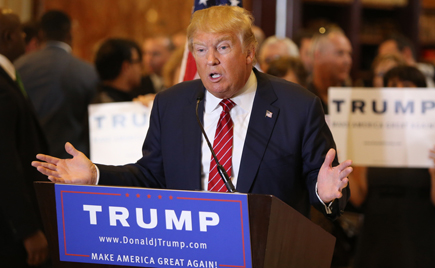Trump the brand, not the candidate
 a katz / Shutterstock.com
a katz / Shutterstock.com
Barely noticed in a sea of odd moments in the October 28th Republican Debate was Mike Huckabee’s homespun acknowledgement that he was wearing a Trump tie. It was a reminder that among the ten candidates on stage, only one was a brand name: Donald Trump.
Pundits will only begin to explain Trump, the political phenomenon, when they recognize that his presidential campaign is also a business strategy.
To recognize Trump’s business agenda, we need, quite literally, to look at what is behind Mr. Trump when he appears on television. Quite often, it is a property he owns. And that explains his campaign: Trump for President is about a profit-making brand as much as an election-seeking man.
Take Trump’s interview with Jake Tapper this past Sunday on CNN’s “State of the Union.” Discussing poll numbers, Trump was framed by the pristine water hazards and manicured fairways of one of his properties. Another shot scanned across the plush faux Greco-Roman columns of—that’s right—Trump National Doral Hotel and Golf Resort. More often, he is interviewed sitting in the lobby of one of the jewels in the Trump crown: Trump Towers in Manhattan.
These are the properties that are being marketed, not Donald Trump’s presidential skills. Although nobody would ever accuse him of the soft sell when it comes to promoting himself, it is his brand that he is really promoting. Like Mitt Romney, Herman Cain, and Carley Fiorina, Trump refers to his business acumen in order to convince voters that he is a leader. But Trump’s primary business is advertising his name, and nothing has done that more effectively, or globally, than running for president.
Unlike the other candidates, Trump is not using advertising techniques to sell himself. Rather, he is using his candidacy to advertise the Trump brand, as in Trump Towers, Trump Casinos, Trump Carousel, Trump Marks Mattress Member Corp., and yes, Trump ties. Of the more than 500 entities owned by Trump that were listed in his financial disclosure, 391 have the word Trump in them.
Increasingly, Trump’s business is selling his brand, not his real estate. As The Washington Post noted several months ago, “Trump has become increasingly reliant on a … business model … in which he makes money by harnessing his celebrity brand rather than risking capital in real estate investments.” Trump is no longer apprenticing for the job of developer or realtor: His run for the presidency coincides with his promotion to advertising account manager for everything branded Trump.
Ever since Joe McGinnis went inside the Nixon campaign in 1968 to write The Selling of the President, Americans have known that advertising guys package presidential candidates. It is commonplace for candidates to be marketed the way toothpaste or cars are hawked. Nor is this new. Even America’s beloved war hero, Dwight D. Eisenhower, relied on Madison Avenue.
By the 1980s, Ronald Reagan’s advertising men had begun to focus on the images behind the candidate. As Martin Schram pointed out in The Great American Video Game, presidential campaigns planned visual imagery years in advance. In Ronald Reagan’s 1984 reelection campaign it was the president raising his arm in front of Lady Liberty’s torch and the president sitting in the broadcast booth, calling the Firecracker 400 in Daytona that Reagan’s team successfully crafted. These images wrapped Reagan in patriotic symbols, or surrounded him with key constituencies like Southern white men. It was the visual backdrops that advertising men cared about most. These are the visual clues that may also reveal what Donald Trump cares about most.
If Trump is using his presidential campaign to push his business, is it a profitable strategy? Does bashing Mexican immigrants, for instance, strengthen his brand? Many would argue it does not. But being outspoken on this issue moved Trump into the lead in a crowded field. That lead, in turn, brings 24-7 attention to his brand. How bad can that be for business?
Eric Trump in effect provided an answer when he assessed how his father’s campaign has affected business. It “has had an immensely positive impact,” the younger Trump crowed, describing the reaction he received when he visited the Trump National Golf Club in Charlotte, NC. “I walked into the grill room and got a standing ovation.”
Political pundits should stop asking what Trump plans to do as president—a question that has garnered laughably vague responses from Trump. Instead, they should examine the impact that his campaign has had on the value of his brand’s bottom line. That valuation may prove to be a far better indicator of his future than the daily polls or the past record of corporate kings running for the presidency.
Meanwhile, Donald Trump is in a win-win situation. He triumphs if he grabs the Republican nomination. But his profits soar even if he drops out. Pundits and reporters would be well advised to analyze the Trump brand in that light.
Brian Balogh is a professor at UVa’s Miller Center and Co-Host of the public radio show and podcast BackStory with the American History Guys.